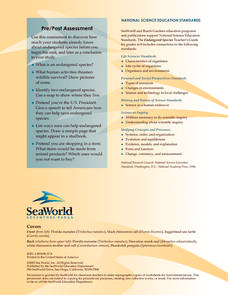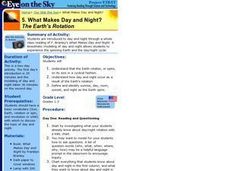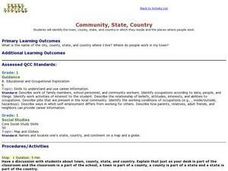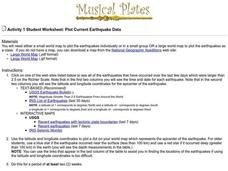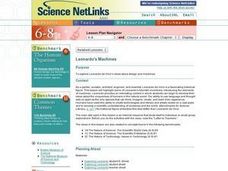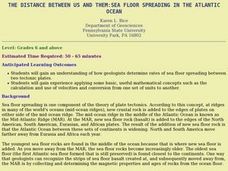Curated OER
Marine Biology Field Trips
Students visit a Marine Biology study area 2-3 times and write a report after the last visit. They participate in the Marine Biology field trips working with lab partners. They complete data sheets to write their primitive environmental...
Curated OER
Properties of Materials - Part B
Students describe the history of materials. They use the kinetic (particle) theory to explain changes of state in matter and trace the flow of heat during changes of state and chemical changes.
Curated OER
Spy vs. Spy?
Students consider their beliefs about proper and improper surveillance and then create imaginary neighborhoods featuring surveillance technology in various public and private sites.
Curated OER
Endangered species
Students define the following words: extinction, endangered species, meteorite collision, glaciation and climate warming. They investigate that there are 307 species on the endangered list, and an average of 10-20 species are added each...
Curated OER
Hurricane Frequency and Intensity
Students examine hurricanes. In this web-based meteorology lesson plan, students study the relationship between ocean temperature and hurricane intensity. They differentiate between intensity and frequency of hurricanes.
Curated OER
Wetland in a Pan
Seventh graders build a watershed from various materials. In this life science lesson plan, the students will be able to change the design of their watershed to see the changes in the way the water will drain. Each group will be able to...
Curated OER
Nature's Recycling Program
Learners identify what materials make up compost. In this science of recycling lesson, students explain the benefits of composting determine how compost is a good plant fertilizer.
Curated OER
Earthquake Unit
Eighth graders watch the "Earth, the Environment & Beyond" video on earthquakes. Take notes and give an oral summary. They build a working, two dimensional model of a strike-slip, thrust, or normal fault.
Curated OER
In a Galaxy Far, Far, Far Away
Sixth graders compare distances between objects in the solar system. They investigate how light years are measured and when using them to measure how distances compare with one another. They write an essay exploring the possibility of...
Curated OER
The Plains Indians
Students have a better understanding of another culture other than their own. This help them to see that there were other people living in this region before us.
Curated OER
Striking Zone
Students review the states and their capitols. On the teachers signal, each student use their hand or a paddle to strike the ball in different ways towards the wall. When the ball hits a state, students recite the capitol of that state.
Curated OER
What Makes Day and Night? The Earth's Rotation
Students discover that the Earth rotates on its axis in a cyclical fashion. They examine how this rotation results in day and night.
Curated OER
Community, State, Country
First graders identify the town, county, state, and country in which they reside and the places where people work. They draw a picture of one of the places where people work.
Curated OER
The Greatest Survival Story of All Time
Students use the Internet to read about an explorer's survival in the Antarctic. They try to find a better route for him to have taken.
Curated OER
The Island of The Blue Eagles
Sixth graders read the book CALL IT COURAGE by Armstrong Sperry. They use the Internet to research and work in groups to write ocean chants. They construct dioramas and build a sea turtle withK'NEX.
Curated OER
Plot Current Earthquake Data
Young scholars review earthquakes larger than 2.5 that have occurred over a span of several days using a given website reference. In this geology instructional activity, students plot epicenters on a world map and depth of the...
Curated OER
People On The Move
Students describe patterns of internal migration in the United States, past and present and evaluate implications of internal migration. They examine population movement at the state and local levels.
Curated OER
Motion of the Sun and Earth: Using a Playground Model to Explore Rotation and Revolution
Learners experience the rotation of the Earth and the Sun and the Earth's revolution around the Sun, using a playground mode.
Curated OER
Sailin' Through Time...Rhode Island, The Ocean State
Fourth graders explore the history of Rhode Island. They research famous people who brought change to the state. They explore the state song, natural resources, and colonies of the state. In groups, 4th graders create a travel brochure...
Curated OER
Space Exploration
Sixth graders identify and interpret the following: What is space?, Space Race, Living in space?, Man on the Moon, Astronaut training; students compare/contrast US and Russia space exploration. Students write a letter of application to...
Curated OER
Colony Crops
Fifth graders determine which crops were grown in the 13 colonies depending on their climate and geography. They explore what crops are grown in the states created from the original colonies.
Curated OER
Leonardo's Machines
Students explore Leonardo da Vinci's ideas about design and machines.
Curated OER
The Distance Between Us and Them: Sea Floor Spreading in the Atlantic Ocean
Young scholars examine how geologists determine rates of sea floor spreading between two tectonic plates. They apply mathematical concepts such as the calculation and use of velocities and conversion from one set of units to another.
Curated OER
Native American Music: Call-and-Response
Students are introduced to call-and-response form of Native American song and dance. They identify and describe a call-and-response form as used in "0 Hal'Lwe."
Male students will perform "0 Hal'Lwe" in call-and-response style with drum...





